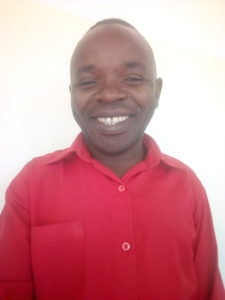10 out of 200: Teaching the teachers – Zirhumanana Balike Dieudonné takes math to rural areas
Jens-Steffen Scherer
Meet Zirhumanana Balike Dieudonné, mathematician and one of this year’s 10 out of 200 young researchers participating in the 7th Heidelberg Laureate Forum from September 22nd – 27th, 2019.

What are your name and your nationality?
My name is Zirhumanana Balike Dieudonné. I am from the Democratic Republic of the Congo (DRC).
Where did you study and where are currently based?
Most recently (June 2019), I have earned my master’s degree in Mathematical Sciences at the African Institute for Mathematical Sciences (AIMS) in Senegal. Prior to this, I started my studies at the Institut Supérieur Pédagogique de Bukavu (Higher Pedagogic Institute from Bukavu) where I earned my Bachelor in Mathematical Physics (2014) and two years later I got a postgraduate degree in Mathematics applied to Pedagogy. I am currently based in the Democratic Republic of the Congo.
What is your current position?
I am currently a part-time tutor at the Institut Supérieur Pédagogique de Bukavu and provide training to secondary school teachers in my village. I am looking forward to starting my Ph.D. studies as soon as possible.
What is the focus of your research? What is your research project?
My research focuses on modeling natural phenomena like the movement of molecules in cells or the spreading of epidemics. My current projects include the modeling of molecules in tilings by Markov chains and the modeling of Ebola outbreak in the east part of DRC (in the context of war and ignorance of population) by using a SIR model.
Why did you become a mathematician?
Since secondary school, I enjoyed mathematics thanks to various reading material although I did not get good professors. I then enrolled in the department of mathematics primarily because I expected to relieve the lack of mathematics teachers in my village. Finally, I realized that most of – if not all – solutions to our daily problems lie in mathematics.
What are some fundamental challenges you have faced in your academic career?
Moving from mathematical physics to mathematics applied to pedagogy was a big challenge because there is a gap between these two fields. During my master studies, I had the challenge of meeting deadlines because of the amount of daily work.
What do you feel the greatest pressures facing scientists today?
The main challenge for scientists today is to provide solutions to the daily problems of our society. Time is faster than scientific findings. Therefore, the quicker time passes, the more dated scientists’ findings are to solve the new challenges.
What are you doing besides research?
I like to read psychological and self-management books, I like jogging and watching or playing football. I also like to hear stories from older people (especially from my father!) in my village.
How did you hear about the HLF and why did you apply?
I read about in the chat group of my university and received much information from a former attendee (Deborah Kanubala from Ghana). I applied because I saw that the HLF is involved in the diffusion of sciences through their yearly forums, which is particularly what I am doing in my village. I thought it would be a nice opportunity to meet other people with the same challenges and learn more from them but also share my experience with them.
What do you expect from this meeting?
I hope to meet experienced researchers in my domain and chat with them about their strategies in research. Since the forum will gather many young researchers, I am excited to meet them and discuss during this forum about our common centers of interest.
Which laureates present at the forum would you really like to talk to and what do you want to ask them?
I respect all the laureates attending the forum but I am particularly delighted to meet Martin Hairer. I have read some of his publications and I guess he is one of the most important mathematicians of this century, a kind of Einstein in Mathematics. I would like to know exactly what has not yet been done to complete the solution of Navier Stokes equations. I would like to know if the unicity of the solution to the Navier stochastic equation has been demonstrated analytically and what the major application of these results in our current context should be.
Who were your most important mentors and what lessons did they pass on to you?
I owe a lot to all my teachers for the sacrifices they made to make me mature scientifically. However, one teacher particularly nourished my mind: Mushiwalyahyage. I learned much from his way of teaching mathematics, I realized how passionate I should be for teaching mathematics. From him, I got the energy to teach mathematics with a new view of my students.
You are teaching math especially in rural areas of your country. What do you find most rewarding doing so?
When you teach in rural areas in a country like the DRC, what you gain is the number of young people you can reach; not money. As far as I am concerned, teaching in my village has allowed me to motivate some talented young people to love mathematics more and more. Today, many of them are ready to enroll in the mathematics or physics departments, but the financial resources are lacking. Before, no young people in my village could even accept a scholarship in these areas. Today the situation has changed and this is quite motivating for me.
Der Beitrag 10 out of 200: Teaching the teachers – Zirhumanana Balike Dieudonné takes math to rural areas erschien zuerst auf Heidelberg Laureate Forum.